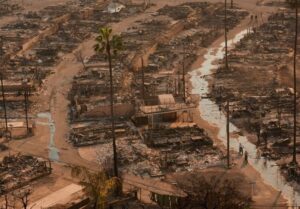Israel Strikes Hezbollah in Lebanon, Targets Weapons Smuggling Routes
In a significant escalation of tensions in the Middle East, Israel has launched airstrikes on Hezbollah positions in Lebanon, focusing on key weapons smuggling routes. The strikes, which took place in the early hours of this morning, are being seen as a direct response to the growing concerns over Hezbollah’s continued arms trafficking, which Israel claims poses a serious security threat.
The Israeli military has stated that its operations are designed to dismantle Hezbollah’s ability to import and distribute weapons that could potentially be used in future attacks against Israeli citizens and interests. This marks the latest chapter in the ongoing conflict between Israel and Hezbollah, a group that is backed by Iran and has been involved in numerous confrontations with Israel over the years.
The Rising Threat of Hezbollah’s Smuggling Network
The primary target of Israel’s strikes were key infrastructure points suspected of being involved in smuggling arms and military equipment from Iran into Lebanon, and ultimately into the hands of Hezbollah. These weapons include advanced missile systems, drones, and other high-tech arms, which Israel fears could be used to destabilize the region or target Israeli cities directly.
Israel has repeatedly warned of the growing threat posed by Hezbollah’s increasing armament. The group has long maintained a significant military presence in southern Lebanon, close to the Israeli border, and has been accused of using Lebanon’s infrastructure to transport weaponry from Iran. The Israeli Defense Forces (IDF) have stated that Hezbollah’s activities are not only a violation of Lebanon’s sovereignty but also a direct threat to Israel’s security.
Israel’s Strategy: Aerial Strikes and Precision Targeting
Israel’s airstrikes were aimed at precise locations identified as key smuggling routes, warehouses, and missile depots. The IDF used its sophisticated intelligence capabilities to track these sites over time, ensuring that the strikes were as targeted as possible to minimize civilian casualties while maximizing the disruption of Hezbollah’s operations.
The Israeli government has made it clear that it will continue to take decisive action against groups like Hezbollah that it believes are acting in ways that endanger its national security. The country’s Defense Minister, Yoav Gallant, reiterated Israel’s right to defend itself from any threats and stated that the strikes were part of an ongoing campaign to curb the flow of weaponry into Lebanon.
The Broader Regional Implications
The latest Israeli strikes are not just a military operation but a signal to the broader region about the country’s stance on Hezbollah and Iran’s involvement in Lebanon. Hezbollah is widely considered to be an Iranian proxy, with substantial backing from Tehran, including financial aid and military support. Israel’s actions in Lebanon reflect its broader concerns about Iranian influence in the region, particularly as Tehran continues to expand its support for militant groups across the Middle East.
Lebanon’s government has yet to officially comment on the airstrikes, but Hezbollah, which holds significant political and military power in Lebanon, has already vowed retaliation. In a statement released shortly after the strikes, Hezbollah condemned the attacks as a “blatant aggression” and promised to respond in kind, further heightening fears of an escalation in the region.
The International Response
The international community has expressed concerns over the potential for further conflict between Israel and Hezbollah, especially given the fragile political situation in Lebanon. The United Nations has called for restraint from both sides, urging dialogue and emphasizing the importance of preserving Lebanon’s sovereignty.
However, Israel’s actions have received backing from some regional allies who view Hezbollah’s smuggling activities as a destabilizing force. The United States, a long-time ally of Israel, has voiced its support for Israel’s right to defend itself against Hezbollah’s activities, while also calling for an urgent de-escalation of tensions.
Meanwhile, countries sympathetic to Hezbollah, including Iran, have condemned the Israeli strikes as an act of aggression, raising concerns that the violence could spread beyond Lebanon and potentially ignite wider regional conflicts.
What’s Next for Israel and Hezbollah?
With tensions high and both Israel and Hezbollah pledging further actions, the situation in Lebanon and Israel remains volatile. The ongoing conflict between Israel and Hezbollah, which has simmered for years, risks escalating into a full-blown confrontation if further provocations occur.
For Israel, its strategy of targeting Hezbollah’s weapons smuggling routes appears to be a calculated move aimed at preventing a future military escalation. However, it also risks intensifying the conflict with Hezbollah, whose leadership is determined to maintain its arsenal and its position as a major military power in the region.
More Stories
Israel Orders Full Evacuation of Gaza City Ahead of Major Attack
The Israeli military has officially ordered the evacuation of the entire Gaza City in preparation for a large-scale military assault....
Spain to Ban Israeli Cargo Ships and Planes from Entering Its Territory
In a major shift in international relations, Spain has announced that it will be blocking Israeli cargo ships and planes...
Putin: Western Soldiers Are Legitimate Targets If They Enter Ukraine
IntroductionIn a shocking statement, Russian President Vladimir Putin declared that any Western soldiers entering Ukraine will be considered legitimate military...
📰 Escalating Violence: Israel Airstrikes Destroy High-Rise Buildings in Gaza City
▶ Brutal Strikes Target Civilian Infrastructure According to local sources and international media, Israeli fighter jets launched a series of...
Coinbase Executive Warns Bitcoin Could Explode Like the South Sea Bubble
In a striking statement that has stirred debate across the crypto industry, a senior executive at Coinbase Asset Management has...
Gemini Crypto Firm Aims for $2.3 Billion Valuation with IPO Plans
Gemini, one of the leading cryptocurrency exchanges, is setting its sights on a massive $2.3 billion valuation as it prepares...

